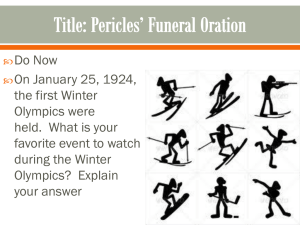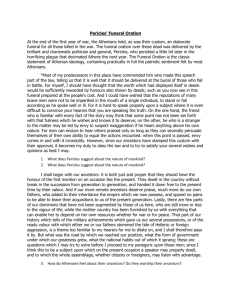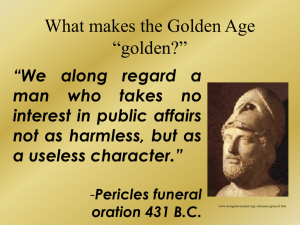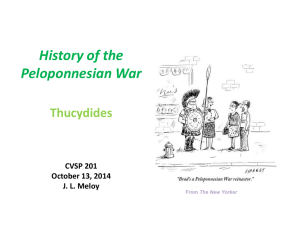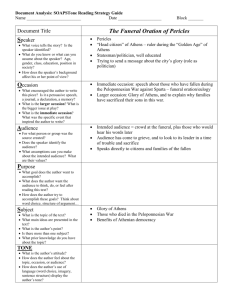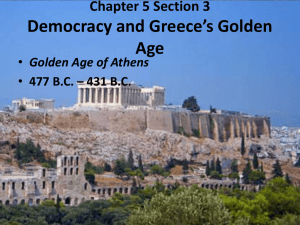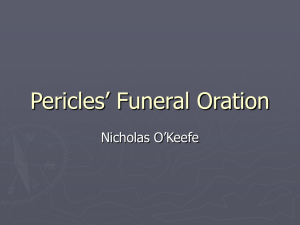Pericles' Funeral Oration: Myth and Action in Athens
advertisement
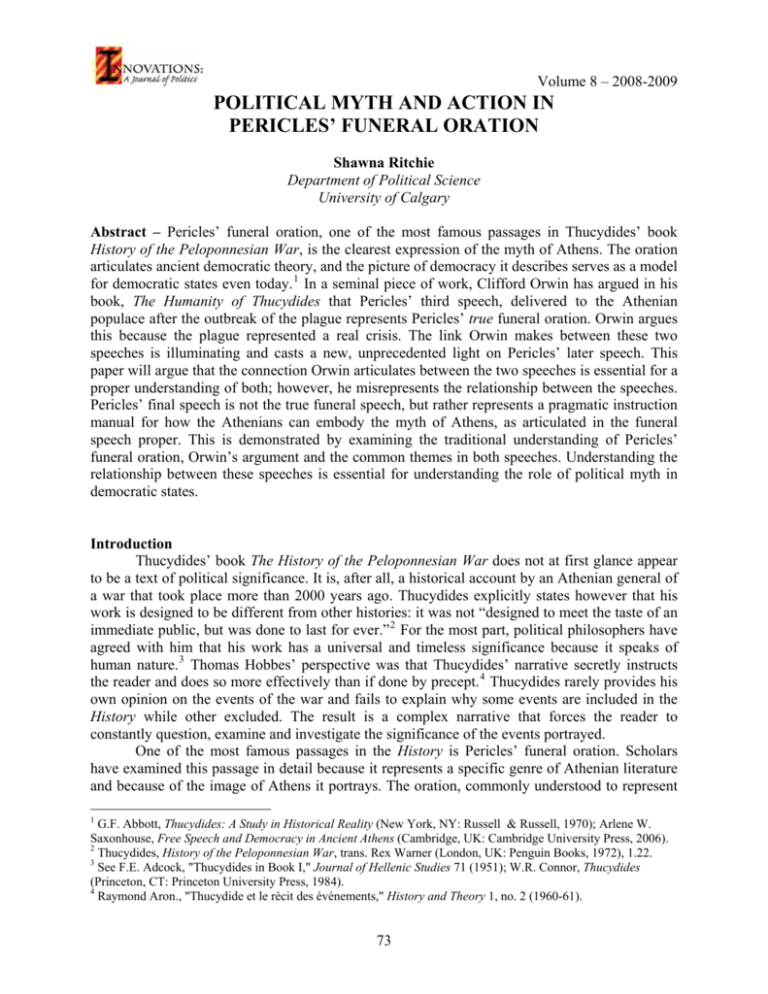
Volume 8 – 2008-2009 POLITICAL MYTH AND ACTION IN PERICLES’ FUNERAL ORATION Shawna Ritchie Department of Political Science University of Calgary Abstract – Pericles’ funeral oration, one of the most famous passages in Thucydides’ book History of the Peloponnesian War, is the clearest expression of the myth of Athens. The oration articulates ancient democratic theory, and the picture of democracy it describes serves as a model for democratic states even today. 1 In a seminal piece of work, Clifford Orwin has argued in his book, The Humanity of Thucydides that Pericles’ third speech, delivered to the Athenian populace after the outbreak of the plague represents Pericles’ true funeral oration. Orwin argues this because the plague represented a real crisis. The link Orwin makes between these two speeches is illuminating and casts a new, unprecedented light on Pericles’ later speech. This paper will argue that the connection Orwin articulates between the two speeches is essential for a proper understanding of both; however, he misrepresents the relationship between the speeches. Pericles’ final speech is not the true funeral speech, but rather represents a pragmatic instruction manual for how the Athenians can embody the myth of Athens, as articulated in the funeral speech proper. This is demonstrated by examining the traditional understanding of Pericles’ funeral oration, Orwin’s argument and the common themes in both speeches. Understanding the relationship between these speeches is essential for understanding the role of political myth in democratic states. Introduction Thucydides’ book The History of the Peloponnesian War does not at first glance appear to be a text of political significance. It is, after all, a historical account by an Athenian general of a war that took place more than 2000 years ago. Thucydides explicitly states however that his work is designed to be different from other histories: it was not “designed to meet the taste of an immediate public, but was done to last for ever.” 2 For the most part, political philosophers have agreed with him that his work has a universal and timeless significance because it speaks of human nature. 3 Thomas Hobbes’ perspective was that Thucydides’ narrative secretly instructs the reader and does so more effectively than if done by precept. 4 Thucydides rarely provides his own opinion on the events of the war and fails to explain why some events are included in the History while other excluded. The result is a complex narrative that forces the reader to constantly question, examine and investigate the significance of the events portrayed. One of the most famous passages in the History is Pericles’ funeral oration. Scholars have examined this passage in detail because it represents a specific genre of Athenian literature and because of the image of Athens it portrays. The oration, commonly understood to represent 1 G.F. Abbott, Thucydides: A Study in Historical Reality (New York, NY: Russell & Russell, 1970); Arlene W. Saxonhouse, Free Speech and Democracy in Ancient Athens (Cambridge, UK: Cambridge University Press, 2006). 2 Thucydides, History of the Peloponnesian War, trans. Rex Warner (London, UK: Penguin Books, 1972), 1.22. 3 See F.E. Adcock, "Thucydides in Book I," Journal of Hellenic Studies 71 (1951); W.R. Connor, Thucydides (Princeton, CT: Princeton University Press, 1984). 4 Raymond Aron., "Thucydide et le récit des événements," History and Theory 1, no. 2 (1960-61). 73 Volume 8 – 2008-2009 the myth of Athens, is frequently studied in isolation from the other speeches of Pericles. However, in his book The Humanity of Thucydides, Clifford Orwin argues that Pericles’ final speech, delivered during the plague, constitutes Pericles’ true funeral oration because the plague was a true crisis. The connection Orwin articulates between the two speeches is essential for a proper understanding of both; however, he misrepresents the relationship between the speeches. Pericles’ final speech is not the true funeral speech, but rather represents a pragmatic instruction manual for how the Athenians can embody the myth of Athens, as articulated in the funeral speech proper. This will be demonstrated by examining the traditional understanding of Pericles’ funeral oration, Orwin’s argument and how the common themes in both speeches demonstrate their relationship. Background The Peloponnesian War between the empires of Athens and Sparta comprises the content of Thucydides’ History. This war “broke out in 431, was briefly terminated by an inconclusive truce between Sparta and Athens in 421, and again began, formally, with the attack of the Spartans in 412 to be concluded with the complete destruction of the Athenians military power and occupation of Athens by the Spartan army in 404.” 5 Throughout the History, Thucydides reports the events of the war, occasionally provides his own interpretation and includes speeches from prominent individuals. Concerning the speeches Thucydides explains, In this history I have made use of set speeches some of which were delivered just before and others during the war. I have found it difficult to remember the precise words used in the speeches which I listened to myself and my various informants have experienced the same difficulty; so my method has been, while keeping as closely as possible to the general sense of the words that were actually used, to make the speakers say what, in my opinion, was called for by each situation. 6 Of all the speeches represented in Thucydides’ History, the most famous is arguably Pericles’ funeral oration to the Athenians at the end of the first year of war. Pericles occupies a central role for two reasons. First, he was the leading citizen of Athens at that time and his vision guided the Athenians’ early actions in the war. Second, general scholarly consensus is that Thucydides was an avid supporter of Pericles and one of the best ways to elucidate Thucydides’ philosophy is to examine the words of Pericles. 7 Thucydides’ History contains three speeches from Pericles. In the first speech, Pericles articulates his policies and programs for how the Athenians can best fight the war. Pericles encouraged the Athenians to concentrate on the advantage of the sea, cautioned against moving out to meet the Spartans, who were superior land warriors, and encouraged them to concentrate their resources exclusively on the war rather than looking to further expansion of the empire. 8 5 David Grene, Greek Political Theory: The Image of Man in Thucydides and Plato (Chicago, IL: The University of Chicago Press, 1950), 3. 6 Thucydides, History of the Peloponnesian War, 1.22. 7 Grene, Greek Political Theory; S. Sara Monoson and Michael Loriaux, "The Illusion of Power and the Disruption of Moral Norms: Thucydides' Critique of Periclean Policy," The American Political Science Review 92, no. 2 (June 1998); Jacqueline de Romilly, Thucydides and Athenian Imperialism, trans. Philip Thody (Oxford, UK: Blackwell, 1963); Leo Strauss, The City and Man (Chicago, IL: The University of Chicago Press, 1964). 8 Thucydides, History of the Peloponnesian War, 1.143. 74 Volume 8 – 2008-2009 This policy is adopted by the Athenians, at least in the beginning, and is shown to have some initial success. Pericles’ second speech is the funeral oration proper, which takes place at the end of the first year of this war. Although Thucydides never mentions how many soldiers have fallen in battle at this time, it is likely the number was not large. James A. Mackin observes, “several skirmishes occurred but the main armies of Athens and Sparta did not meet; and so the number of Athenian dead was probably relatively small at this point.” 9 At the time of the oration then, the Athenian community was merely observing a ritual by holding the funeral oration, they were not in mourning and had not suffered severe losses. 10 The third, and final, speech of Pericles takes place in 430 BCE after the outbreak of the plague, which devastated Athens. The Athenians underwent a dramatic shift during this time in their attitudes towards the war, Pericles, and the Athenian role in the war. Thucydides summarizes the Athenian perspective as follows, After the second invasion of the Peloponnesians there had been a change in the spirit of the Athenians. Their land had been twice devastated, and they had to contend with the war and the plague at the same time. Now they began the blame Pericles for having persuaded them to go to war and to hold him responsible for all the misfortunes which had overtaken them; they became eager to make peace with Sparta and actually sent ambassadors there, who failed to achieve anything. They were then in a state of utter hopelessness, and all their angry feelings turned against Pericles. 11 This was the context for the third speech and with this speech, Pericles defends his policies and programs and encourages the Athenians to sustain their effort. Shortly after delivering the third speech, Pericles succumbed to the plague and died. The contextual differences between the funeral oration proper and Pericles’ final speech are important for understanding the arguments of both Clifford Orwin and this paper. The Funeral Oration in Ancient Greece The funeral oration Pericles delivers at the end of the first year of the war is unquestionably significant. It is the clearest expression of the Athenian ideal or the myth of Athens. Lowell Edmunds observes that in the funeral oration Pericles emphasizes the quality of the Athenian constitution and character, which is significant because it highlights and celebrates that which is unique and characteristic of Athens. 12 Clifford Orwin succinctly notes that “[t]he funeral oration articulates, with the highest artfulness, a portrait of the Athenian empire in its Sunday best.” 13 The funeral oration portrays the idealized self-image of the Athenians. This myth of Athens sets the standard for Athenian conduct and is the ideal referred to for the remainder of Thucydides’ History. The Athenian ideal presented in Pericles’ oration has influenced political philosophy through to the modern day and continues to represent a standard 9 James A. Mackin, "Schismogenesis and Community: Pericles' Funeral Oration," Quarterly Journal of Speech 77, no. 3 (August 1991): 252. See also Abbott, Thucydides, 40. 10 Abbott, Thucydides, 41. 11 Thucydides, History of the Peloponnesian War, 2.59. 12 Lowell Edmunds, Chance and Intelligence in Thucydides (Cambridge, MA Harvard University Press, 1975), 45. 13 Clifford Orwin, The Humanity of Thucydides (Princeton, CT: Princeton University Press, 1994), 28-29. 75 Volume 8 – 2008-2009 for democratic societies. Almost all scholars, however, have tended to study and examine the funeral oration in isolation from Pericles’ other speeches. Pericles’ funeral oration is long and complex. He begins the oration by discussing the difficulty of honouring the dead, for to speak too little will offend those who knew them best and to speak too highly will cause envy among those who knew them not. This is because “[p]raise of other people is tolerable only up to a certain point, the point where one still believes that one could do oneself some of the things one is hearing about. Once you get beyond this point, you will find people becoming jealous and incredulous.” 14 In an effort to resolve this dilemma, Pericles spends most of the speech praising the city, praising Athens, as a whole. In this way, he is unlikely to offend anyone, as the audience is Athenian. He praises the city by discussing its constitution, military service, educational system, the attitudes of Athenians towards beauty and wealth, and the general character of Athens. Once all of this is completed, he returns to the fallen soldiers and argues that these men were worthy of their city and those who mourn them should be grateful for the honour they have brought to Athens. One of the reasons the funeral oration has been treated in isolation is because it represents a specific genre in Athenian custom and requires a specific context. Funeral orations, or epitaphios, occupied an important place in the Athenian tradition. Demosthenes even goes so far as to claim they are an exclusive Athenian invention. 15 These orations took place exclusively at public funerals designed to honour soldiers who had fallen in battle. Thucydides carefully sets the scene for Pericles epitaphios by describing precisely how the funeral takes place, the coffins, the procession, the decorations, and finally, the speech itself. 16 Thucydides further introduces the speech by stating, “a man chosen by the city for his intellectual gifts and for his general reputation makes an appropriate speech in praise of the dead, and after the speech all depart.” 17 Thucydides goes on to note that this tradition was carried on throughout the course of the war (although Pericles’ speech is the only one recorded in the History) and that this was in keeping with the ancient customs of Athens. Perhaps part of the reason Pericles’ oration has received such attention is because although the practice was an ancient one, only a few epitaphios have survived to modern day and of those, only a few are considered to be true representations of the genre. 18 Note that Thucydides specified a man would be chosen to make an appropriate speech. This is not just a speech appropriate to the occasion but also one that matched the formulaic prescriptions of the epitaphios. The epitaphios, according to Edinger, “consisted of a number of recognized topics: praise of the dead, praise of the ancestors, praise of the city, consolation of the families of the dead. The success of the orator on each occasion would be measured by how well he renewed, combined, and varied traditional topics.” 19 There are a number of key elements to 14 Thucydides, History of the Peloponnesian War, 2.35. Demosthenes, "Against Leptines 141," in Demosthenes with an English Translation, ed. C. A. Vince and J. H. Vince (Cambridge, MA: Harvard University Press, 1926). 16 Thucydides, History of the Peloponnesian War, 2.34. 17 Ibid. 18 The authors of surviving epitaphioi includes Thucydides, Gorgias, Lysias, Plato, Demosthenes and Hyperides although many of these have been called into question. For more information on ancient epitaphioi please refer to Nicole Loraux, The Invention of Athens: The Funeral Oration in the Classical City (New York, NY: Zone Books, 2006), 34-42; John E. Ziolkowski, Thucydides and the Tradition of Funeral Speeches at Athens (Salem, NH: The Ayer Company, 1981). 19 Thucydides, The Speeches of Pericles, trans. H. G. Edinger (New York, NY: F. Ungar Publishing Company, 1979), 44. 15 76 Volume 8 – 2008-2009 an epitaphios. It is only performed as a public oration, designed to honour those who have fallen in battle, a leading male citizen is selected for his intellect and reputation to deliver the speech and there is an almost formulaic outline of what topics need to be covered in the speech upon which the speaker will be judged. Nicole Loraux argues that because funeral orations were so intimately connected with the historical and traditional circumstances they failed to become widely utilized. 20 This, in part, accounts for why there are so few funeral orations existent in the modern era. The circumstances and traditions they represented were what gave them meaning and what restricted them from becoming more prolific. Funeral orations derive their meaning and their purpose from the observation of tradition and ritual. Pericles funeral oration clearly fits into this genre in a formulaic sense, the context as well as the thematic content of the speech was in keeping with the requirements of the epitaphios. Pericles’ Funeral Oration Although Pericles’ oration clearly fits the prescriptive requirements of the epitaphios there are a number of interesting nuances in his speech. First, Pericles is clear that the Athenian empire was not the product of necessity. Rather, “Pericles depicts imperial Athens as the noblest of human projects, freely undertaken by the citizens of Athens in full awareness of all that it entails.” 21 Pericles emphasizes this by noting the spontaneity of the empire, which the Athenians could not help but develop because of their generosity and goodwill towards others. Since the Athenians were so kind to others, their friends felt indebted to them and so formed an alliance with Athens at the head. 22 The argument is that the Athenians almost could not help but obtain an empire. It is not because they were seeking advantage, but because of their virtue and their worthiness to rule. They are so gracious to their friends and formidable to their enemies that what really bothers their allies is the burden of their gratitude. Allies are unable to benefit Athens as freely as she has benefited them. Pericles also discusses the ancestors, the gods and the poets although his comments are somewhat deprecating. The format of the epitaphios demanded a discussion of the ancestors, especially since the ceremony itself derives its meaning from tradition and yet, Pericles only emphasizes recent accomplishments. As Orwin notes, “of an ancestral ritual Pericles makes an occasion of celebrating the virtue of the past two generations and the present one most of all.” 23 In addition, he presents an attitude of derogation to the gods and to Homer. Pericles says: “[w]e do not need the praises of a Homer, or of anyone else whose words may delight us for the moment, but whose estimation of facts will fall short of what is really true.” 24 Edmund notes that Pericles simply carries the ideas of Aeschylus one step further and presents an account of Athens where “the gods have disappeared altogether, and the strength of the city now appears as originating in human will, specifically, in Athens, in individual rational freedom.” 25 The success of the empire has rendered the gods superfluous because, according to Pericles, the empire satisfies the deepest longings of human beings without reference to the divine. In addition to downplaying the gods and the ancestors, Pericles advocates a derogation of the private in favour of the public life. He does this by expressing the virtues of the Athenians as 20 Loraux, The Invention of Athens, 331. Orwin, The Humanity of Thucydides, 15. 22 Thucydides, History of the Peloponnesian War, 2.40. 23 Orwin, The Humanity of Thucydides, 16. See also Saxonhouse, Free Speech and Democracy in Ancient Athens, 42. 24 Thucydides, History of the Peloponnesian War, 2.41. 25 Edmunds, Chance and Intelligence in Thucydides, 46. 21 77 Volume 8 – 2008-2009 distinct from the Spartans or the Persians; the Athenian character is what defines Athens. He also advocates this position by returning briefly, at the end of the speech, to the fallen soldiers and their families, Rather than merely promising glory to those who lose what is most their own (their lives) in defense of their own, Pericles presents glory itself as that which is most one’s own – and the imperial city as the primary human community, because it provides the means of achieving apotheosis through glory. 26 This derogation of the private is relevant to the body, the family and property and this is what accounts for Pericles’ words to the parents, siblings and widows of the dead. The myth of Athens presented by Pericles emphasizes three things: first, the Athenian empire was a spontaneous development, which resulted from Athenian virtue. Second, the present generation is the culmination of Athenian civilization and the empire the greatest fulfillment of human desire, which had replaced even the need for the gods. Finally, it espouses the integration of the public and the private spheres because all Athenians will benefit from the eternal glory of Athens. Through these broad themes, Pericles successfully fulfills the requirements of the epitaphios although slightly sardonically. He speaks praises of the dead, although not too much for fear of inspiring jealousy; he praises the ancestors, although diminishes their accomplishments by comparing them to contemporary ones; he praises the city and he consoles the families of the dead by assuring them that the glory of Athens is more enduring than their grief. Pericles’ oration then is undoubtedly an epitaphios in regards to both content and context and this is how is has generally been understood but it also raises some interesting paradoxes. Orwin’s Claim: An Analysis Funeral orations were contextually significant custom where the Athenians collectively mourned those lost in battle. James A. Mackin believes the funeral oration was needed after the end of the first year because, “the need to reaffirm a sense of identity as a community is especially strong during times of crisis.” 27 In the book The Humanity of Thucydides, Clifford Orwin conducts an extensive analysis of Pericles’ funeral oration and makes a very interesting claim. He observes that Pericles’ funeral oration takes place during a time when there had been no significant losses. The main armies of Athens and Sparta had not yet met and the numbers of dead were quite low. By contrast, when Pericles makes his third speech, he defends his policies “amidst the hardships of plague and siege.” 28 At the time of the third speech, the Athenians were absolutely devastated by the plague. As Thucydides states, “the catastrophe was so overwhelming that men, not knowing what would happen next to them, became indifferent to every rule of religion or of law. All the funeral ceremonies which used to be observed were now disorganized, and they buried the dead as best they could.” 29 It is in this context that Pericles delivers his third speech and this, Orwin argues, is Pericles’ true funeral oration. He states, While the first year of the war has brought inconvenience and exasperation, there have been no significant losses, so the funeral 26 Orwin, The Humanity of Thucydides, 18-19. Mackin, "Schismogenesis and Community: Pericles' Funeral Oration," 252. 28 Orwin, The Humanity of Thucydides, 20. 29 Thucydides, History of the Peloponnesian War, 2.52. 27 78 Volume 8 – 2008-2009 speech need not come to grip with these; in this respect the final speech, addressed to an audience sunk in its private miseries, comprises Pericles’ true funeral oration. 30 The final speech of Pericles is delivered to an irate Athenian crowd weary of the war, questioning the wisdom of Pericles and with an eye toward capitulation. This, not a few fallen soldiers, represents a crisis. This situation, rather than the second speech, requires an affirmation of the communal Athenian identity. Although the final speech begins on a more sober note than the oration proper, once Pericles has addressed some of the main concerns, he strives, in the second half of the speech, to slowly elevate the ideas to a glorification of Athens and her empire. Pericles states at the end of this speech, Yet still it will be remembered that of all Hellenic powers we held the widest sway over the Hellenes, that we stood firm in the greatest wars against their combined forces and against individual states, that we lived in a city which had been perfectly equipped in every direction and which was the greatest in Hellas. 31 This speech is designed to console, coax and encourage the Athenians. It reminds them of who they are and what being Athenian means. The speech occurs at a time of crisis by the leading citizen of the state, it addresses the relationship of public and private, and it praises the ancestors and the city as a whole. On all of these counts, it matches the formulaic requirements of the epitaphios. However, the contextual requirements of the epitaphios are not fulfilled by this final speech. The speech does not take place at an official funeral, the dead have not fallen in battle, there is no procession or construction of coffins and Pericles was not selected to make a speech, rather he was forced to make one. There are undoubtedly connections between these two speeches though it is not clear what their precise relationship is. Many similar themes are present in both speeches including, the integration of the public and the private, the reputation of Athens, the formation of the empire, and the perils of war. There is, however, a very different tone or attitude towards these themes in the two speeches. The oration speech minimizes the hardship of war, espouses the superiority of the present generation over the previous and explains that the empire was formed spontaneously by the goodwill of the Athenians. By contrast, the final speech discusses the tremendous difficulties the Athenians will have to face and the suffering they will endure. Pericles tells the present generation that if they do not live up to their reputation they will fall below the state of those who came before them, 32 and even admits that the empire was a conscious undertaking that may have been unjust. The funeral oration proper embodies the quintessential myth of Athens. Pericles presents Athens as an open democratic state whose citizens find meaning and fulfillment through the glory of the city and the empire. Athenians are philosophers without being soft, they are warriors as well as politicians, in every aspect of life, Athenians manifest the ideal of human 30 Orwin, The Humanity of Thucydides, 20. Thucydides, History of the Peloponnesian War, 2.64. 32 Ibid., 2.62. 31 79 Volume 8 – 2008-2009 accomplishment. Many of the claims of Pericles appear outlandish and yet, as Sara Monoson observes, for Thucydides' narrative to have had any serious effect on his contemporary readers, this initial portrait of Athens' best self would have to have been arresting for its attractiveness and familiarity to them. The self-congratulatory image of democratic Athens presented in the speech had to be a clear and compelling account of the Athenians’ self-image. 33 Thucydides’ History structurally shows a progressive Athenian degeneration from the climactic high of Pericles’ funeral oration. 34 Monoson’s argument is that for contemporary readers, this idea of Athens would necessarily have been familiar and attractive and because it was so familiar, the degeneration would have been even more dramatic. It was also the purpose of the funeral oration to sing the praises of Athens. Even Plato comments on this practice when he has Socrates comment on funeral orations, In every conceivable form they praise the city, and they praise those who died in war, and all our ancestors who went before us, and they praise ourselves also who are still alive, until I feel quite elevated by their laudations, and I stand listening to their words, Menexenus, and become enchanted by them, and all in a moment I imagine myself to have become a greater and nobler and finer man than I was before. 35 Although it is likely Socrates’ words were designed to be somewhat sarcastic, 36 this passage still illustrates the common practice of the epitaphios. The customary practice was to honour Athens and this idea, or myth, of Athens would have been familiar to contemporary Athenians. 37 It is likely then that the Athenian population, at the beginning of the war when they have not yet suffered any serious losses, is perfectly willing to believe the myth of Pericles without question because it is an accurate representation of their self-image. By the time of the final speech however, the people are beginning to waver and are questioning the wisdom of Pericles. His final speech is not designed to console them in their suffering but rather to remind them of the myth of Athens. The final speech explicitly lays out the actions required for the Athenians to live up to their own ideals. The funeral oration is a clear expression of the Athenian myth, and the final speech an instruction manual on how to embody that myth. 33 S. Sara Monoson, "Citizens as Erastes: Erotic Imagery and the Idea of Reciprocity in the Periclean Funeral Oration," Political Theory 22, no. 2 (May 1994). 34 Francis Macdonald Cornford, Thucydides Mythistoricus (London, UK: Edward Arnold, 1907). 35 Plato, "Menexenus," in The Collected Dialogues of Plato: Including the Letters, ed. Edith Hamilton and Huntington Cairns (Princeton, CT: Princeton University Press, 1961), 235 b-c. 36 Susan D. Collins and Devin Stauffer, "The Challenge of Plato's Menexenus," The Review of Politics 61, no. 1 (Winter 1999); Charles H. Kahn, "Plato's Funeral Oration: The Motive of the Menexenus," Classical Philology 58, no. 4 (October 1963); Stephen G. Salkever, "Socrates' Aspasian Oration: The Play of Philosophy and Politics in Plato's Menexenus," The American Political Science Review 87, no. 1 (March 1993). 37 Donald Kagan., Pericles of Athens and the Birth of Democracy (New York, NY: The Free Press, 1991), 213. 80 Volume 8 – 2008-2009 The Relationship between the Funeral Oration and Pericles’ Final Speech This relationship between the two speeches can be seen by examining the details of the main themes present in both. For example, one theme present in both is the role of the ancestors. In the funeral oration, Pericles largely derogates the ancestors by emphasizing the primacy of the most recent generation over the previous ones. They [the ancestors] certainly deserve our praise. Even more so do our fathers deserve it. For to the inheritance they had received they added all the empire we have now, and it was not without blood and toil that they handed it down to us of the present generation. And then we ourselves, assembled here today, who are mostly in the prime of life, have, in most directions, added to the power of the empire and have organized our State in such a way that it is perfectly well able to look after itself both in peace and in war. 38 This derogation is very odd in a traditional speech designed to honour the dead, but it makes complete sense when this speech is understood as an articulation of the mythical Athenian ideal. The interpretation that Athens had been progressing out of barbarism and developing towards the culmination of society is in keeping the understanding of history presented by Thucydides in the archaeology. 39 Pericles is emphasizing the significant role the current generation has played in Athenian success. The myth of Athens, then, is that this generation represents the ‘prime’ and they have done such a good job that the empire is stable enough to survive both war and peace. 40 Compare these to the words of Pericles in the final speech. At this time, the Athenians are growing weary of the war and angry towards Pericles. They were sending emissaries to Sparta seeking for peace. In regards to this, Pericles admonishes them by saying: Remember, too, that freedom, if we preserve our freedom by our own efforts, will easily restore us to our old position; but to submit to the will of others means to lose even what we still have. You must not fall below the standard of your fathers, who not only won an empire by their own toil and sweat, without receiving it from others, but went on to keep it safe so that they could had it down to you. And, by the way, it is more of a disgrace to be robbed of what one has than to fail in some new undertaking. 41 Here, the tone towards the ancestors is entirely different from the funeral oration; the ancestors are referred to as a standard of conduct. They won the empire through toil and sweat and it would be shameful to lose what was already won. This perspective emphasizes the work required to maintain the empire. It contrasts with the one articulated in the funeral oration as it becomes clear that the present generation is not inherently superior to those that came before it. Rather, superiority is the myth of the present generation and Pericles is reminding them that if they want to maintain the idea of superiority, they need to fight for what is already theirs. He 38 Thucydides, History of the Peloponnesian War, 2.36. Ibid., 1.1-23. 40 Ibid., 2.36. 41 Ibid., 2.62. 39 81 Volume 8 – 2008-2009 explicitly tells them that suffering will need to be endured in order to maintain the reputation that he himself articulated in the funeral oration. [Y]ou must therefore be willing to face the greatest disasters and be determined never to sacrifice the glory that is yours. We all look with distaste on people who arrogantly pretend to a reputation to which they are not entitled; but equally to be condemned are those who, through lack of moral fibre, fail to live up to the reputation which is theirs already. 42 This demonstrates a fundamental difference between the two speeches of Pericles. The first articulates the idea of Athens and the second tells the Athenians what will be required of them to deserve their reputation. Another key difference between the two speeches is Pericles’ account of how the empire came to be. In the funeral oration, the empire was a spontaneous project. This was an idealistic account of the empire and could only have been uttered to an audience that believed in the inherent goodness of the Athenians and had not yet suffered as a result of the dissatisfaction of their allies. Once the Athenians started to suffer, Pericles returns to the issue of the empire. In the final speech, his observations are very different and highlight the discrepancies between actions and ideas. In it, Pericles reminds the Athenians of what is at stake should they abandon the war; [T]here is also involved the loss of our empire and the dangers arising from the hatred which we have incurred in administering it. Nor is it any longer possible for you to give up this empire, though there may be some people who in a mood of sudden panic and in a spirit of political apathy actually think it would be a fine and noble thing to do. Your empire is now like a tyranny: it may have been wrong to take it; it is certainly dangerous to let it go. 43 This is a markedly different perspective than the one first expressed by Pericles and the idea of it is out of keeping with the context of an epitaphios. If it is assumed that Pericles’ account of the empire in the funeral oration was correct and the Athenian empire was a conglomeration of the friends of Athens overwhelmed by the continued graciousness of the Athenians, it is illogical the allies would, first, hate Athens and second, take advantage of her in a weak moment. Instead, it seems likely that the spontaneous development of the empire expressed by Pericles in the funeral oration was a myth the Athenians chose to believe. The purpose of Pericles’ comments in the second speech is not to delude anybody about the true nature of the empire. Instead, the purpose of his comments is almost exclusively realist. Pericles is presenting an intelligent assessment of the situation that does not rely on hope, myth or the best-case scenario, but accurately portrays the situation at hand. This demonstration of the state of the Athenian empire is designed to show the Athenians the true cost of capitulation, to show them all they have to lose. The interesting element of the final speech is that Pericles is relying on logic, intelligence and assessment but his rationale for doing so is the maintenance of the Athenian myth. The idea or myth of Athens is the reason he says the Athenians need to act in this way. In doing so, he consoles them that these dangers will get better with time. He reassures them that all “who have taken it upon themselves to rule over others have incurred hatred and 42 43 Ibid., 2.61. Ibid., 2.63. 82 Volume 8 – 2008-2009 unpopularity for a time; but if one has a great aim to pursue, this burden of envy must be accepted, and it is wise to accept it.” 44 What becomes clear is that Pericles is playing to the myth of Athens that the Athenians themselves believe. He is providing them with a tangible action plan and directions about how they should be acting, behaving and thinking in the war. The underlying reason he gives for these actions is that they would be consistent with the myth of Athens. This is true right down to the last sentence of his final speech where he says, “[d]o not send embassies to Sparta: do not give the impression that you are bowed down under your present sufferings! To face calamity with a mind as unclouded as may be, and quickly react against it – that, in a city and in an individual, is real strength.” 45 Pericles is calling on the Athenians to act in a particular way, and the implicit reason he provides for why they should do is that these actions would be worthy of the reputation, the myth, of Athens. Conclusion In both the funeral oration and the final speech, Pericles discusses the ancestors, the formation of the Athenian empire, the distinctive characteristics of Athens and the glory of the city. It is clear that the two speeches are interconnected. There is however a very different purpose for these ideas in the two speeches. In the funeral oration, the overall purpose is to articulate the myth of Athens, how the Athenians saw themselves, or at least, how they would like to see themselves. The final speech, by contrast, is more pragmatic and action-oriented, but the actions being encouraged are all given meaning by referring them back to the myth of Athens previously articulated. The funeral oration is the true myth of Athens, and Pericles’ final speech is a practical explanation of how the Athenians can attain the heights of their own mythology. Orwin’s insight about the connection of the two speeches is crucial to this understanding and his analysis lends a complexity and richness to the speeches of Pericles that are absent when they are examined in isolation. Orwin however does not take his analysis far enough. He does not examine the relationship of these two speeches and as a result, he fails to articulate the purposeful difference between them. Understanding the two final speeches of Pericles as connected, one articulating the myth of Athens and the other explaining how to fulfill that myth, has great implications for the understanding of the nature of political myth. The structure of Thucydides’ narrative is such that the myth of Athens, articulated by Pericles in the funeral oration, comprises the golden standard. To this day democrats refer to the ideal of democracy presented by Pericles in the funeral oration as an ideal to be sought after. Political myth is not a new concept, but when Pericles final speech is included in the analysis, the import of political myth changes. What becomes clear is that myths do not independently provide a clear course of action. When the Athenians were becoming weary of the war, Pericles did not encourage them to act with virtue and goodwill towards other countries and expect that all would be well. Rather, he told them directly that submission was dangerous, as they had inspired hatred from others through their administration of the empire. There is a complex relationship between believing in an idea and acting in a way that superficially seems to contravene the very idea you are striving to protect. The myth of Athens did not tell Athenians how to act; instead, it provided a justification for their actions. The Athenians were required to act tyrannically towards their subjects in order to preserve the myth that their empire sustained itself through their virtue. This complex nature of political myth is 44 45 Ibid., 2.64. Ibid. 83 Volume 8 – 2008-2009 one of the lessons Thucydides teaches, although not through precept, only through investigation and examination does this lesson become clear. Bibliography Abbott, G.F. Thucydides: A Study in Historical Reality. New York, NY: Russell & Russell, 1970. Adcock, F.E. "Thucydides in Book I." Journal of Hellenic Studies 71 (1951): 2-12. Aron, Raymond. "Thucydide et le récit des événements." History and Theory 1 (1960-61): 103128. Aron., Raymond. "Thucydide et le récit des événements." History and Theory 1, no. 2 (1960-61): 103-128. Collins, Susan D., and Devin Stauffer. "The Challenge of Plato's Menexenus." The Review of Politics 61, no. 1 (Winter 1999): 85-115. Connor, W.R. Thucydides. Princeton, CT: Princeton University Press, 1984. Cornford, Francis Macdonald. Thucydides Mythistoricus. London, UK: Edward Arnold, 1907. Demosthenes. "Against Leptines 141." In Demosthenes with an English Translation, edited by C. A. Vince and J. H. Vince. Cambridge, MA: Harvard University Press, 1926. Edmunds, Lowell. Chance and Intelligence in Thucydides. Cambridge, MA Harvard University Press, 1975. Grene, David. Greek Political Theory: The Image of Man in Thucydides and Plato. Chicago, IL: The University of Chicago Press, 1950. Kagan., Donald. Pericles of Athens and the Birth of Democracy. New York, NY: The Free Press, 1991. Kahn, Charles H. "Plato's Funeral Oration: The Motive of the Menexenus." Classical Philology 58, no. 4 (October 1963): 220-234. Loraux, Nicole. The Invention of Athens: The Funeral Oration in the Classical City. New York, NY: Zone Books, 2006. Mackin, James A. "Schismogenesis and Community: Pericles' Funeral Oration." Quarterly Journal of Speech 77, no. 3 (August 1991): 251-262. Monoson, S. Sara. "Citizens as Erastes: Erotic Imagery and the Idea of Reciprocity in the Periclean Funeral Oration." Political Theory 22, no. 2 (May 1994). 84 Volume 8 – 2008-2009 Monoson, S. Sara, and Michael Loriaux. "The Illusion of Power and the Disruption of Moral Norms: Thucydides' Critique of Periclean Policy." The American Political Science Review 92, no. 2 (June 1998): 253-276. Orwin, Clifford. The Humanity of Thucydides. Princeton, CT: Princeton University Press, 1994. Plato. "Menexenus." In The Collected Dialogues of Plato: Including the Letters, edited by Edith Hamilton and Huntington Cairns. Princeton, CT: Princeton University Press, 1961. Romilly, Jacqueline de. Thucydides and Athenian Imperialism. Translated by Philip Thody. Oxford, UK: Blackwell, 1963. Salkever, Stephen G. "Socrates' Aspasian Oration: The Play of Philosophy and Politics in Plato's Menexenus." The American Political Science Review 87, no. 1 (March 1993): 133-143. Saxonhouse, Arlene W. Free Speech and Democracy in Ancient Athens. Cambridge, UK: Cambridge University Press, 2006. Strauss, Leo. The City and Man. Chicago, IL: The University of Chicago Press, 1964. Thucydides. History of the Peloponnesian War. Translated by Rex Warner. London, UK: Penguin Books, 1972. ———. The Speeches of Pericles. Translated by H. G. Edinger. New York, NY: F. Ungar Publishing Company, 1979. Ziolkowski, John E. Thucydides and the Tradition of Funeral Speeches at Athens. Salem, NH: The Ayer Company, 1981. 85
